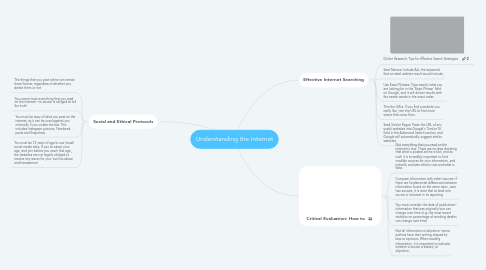Understanding the Internet
by Cam O'Rourke

1. Social and Ethical Protocols
1.1. The things that you post online can remain there forever, regardless of whether you delete them or not
1.2. You cannot trust everything that you read on the internet– no source is obliged to tell the truth
1.3. You must be wary of what you post on the internet, as it can be used against you criminally if you violate the law. This includes Instagram pictures, Facebook posts and Snapchats.
1.4. You must be 13 years of age to use (most) social media sites. If you lie about your age, and join before you reach that age, the websites are not legally obliged to resolve any issues for you– such as abuse and harrassment
2. Effective Internet Searching
2.1. Online Research: Tips for Effective Search Strategies
2.2. Start Narrow: Include ALL the keywords that an ideal website result would include.
2.3. Use Exact Phrases: Type exactly what you are looking for in the 'Exact Phrase' field on Google, and it will deliver results with the search words in the exact order.
2.4. Trim the URLs: If you find a website you really like, trim the URL to find more where that came from.
2.5. Seek Similar Pages: Paste the URL of any useful websites into Google's 'Similar To' field in the Advanced Search section, and Google will automatically suggest similar websites.
3. Critical Evaluation: How to
3.1. Not everything that you read on the internet is true. There are no laws dictating that what is posted online is fact, and as such it is incredibly important to find credible sources for your information, and critically evaluate what is true and what is false.
3.2. Compare information with other sources– if there are fundamental differences between information found on the same topic, over two sources, it is clear that at least one source is incorrect in its reporting
3.3. You must consider the date of publication– information that was originally true can change over time (e.g. the most recent statistics on percentage of smoking deaths can change over time)
3.4. Not all information is objective– some authors have their writing shaped by bias or opinions. When reading information, it is important to evaluate whether a source is biased, or objective.


